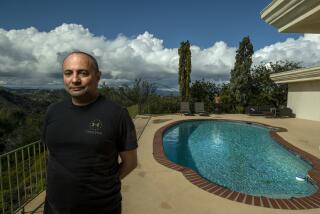Communists’ Victorious Leader a Study in Flexibility : Russia: Gennady Zyuganov has boosted his party by mixing Soviet-style rhetoric and forward-looking image.
- Share via
MOSCOW — Gennady A. Zyuganov, the leader of Russia’s Communist Party, does not mention the name Lenin in public very often. But he likes to tell this tale:
When Leon Trotsky was Lenin’s defense minister, the Germans told him to show up for peace talks in a tuxedo. At first he refused; for a Bolshevik, that would be politically incorrect. Then Lenin ordered: “Go naked if you have to, but save the revolution!”
Zyuganov admires the father of the Soviet Union above all for his flexibility. That same quality has helped the former rural schoolteacher maneuver to the top of Lenin’s moribund party and, while keeping some Leninist ideals and shedding others, revive it as the leading political force in Russia.
On Sunday, Communists won 22% of the vote to finish first in Russia’s parliamentary election. Zyuganov managed this comeback with tireless stumping--272 speeches in 40 cities during the monthlong campaign--and rhetoric of nostalgia for the Soviet welfare state.
At the same time, he has nurtured the image of a forward-looking social democrat open to broad coalitions at home and capitalist investment from the West.
“Just look at me,” he said after voting Sunday. “How could anyone fear me?”
Gennady Andreyevich Zyuganov is a big man with rough charm, a deep voice and ponderous speech. Until three years ago, he was barely noticed, much less feared.
A son of teachers, he was born 51 years ago in a village in the central province of Orel. He joined the party while serving in a chemical weapons reconnaissance unit of the Soviet army in East Germany, then returned home to train teachers and earn a master’s in philosophy.
In Mikhail S. Gorbachev’s Soviet Communist Party, Zyuganov was the No. 2 man in a department that wrote ideological treatises for the Central Committee. An ambitious apparatchik with limited career prospects, he rebelled against Gorbachev’s reforms in 1990, helped other obscure hard-liners set up the Russian Communist Party and was elected to its Politburo.
When the Soviet Union collapsed in 1991 and its disgraced leaders went into lucrative businesses or reform politics, Zyuganov and others of his rank were left holding the red flag. Once Russian President Boris N. Yeltsin’s ban on the party was lifted in late 1992, Zyuganov legally registered it and became its chairman.
Under Zyuganov’s flexible hand, Communists have stayed out of trouble and softened their tenets. His timely break with Yeltsin’s violent foes in the bloody parliamentary revolt of October 1993 allowed the party to run as a legal opposition group in elections two months later while the revolt’s leaders were in jail. The Communists’ third-place finish turned Zyuganov into a national figure.
The party’s new acceptance of religious freedom, political pluralism and private property reflects, in part, Zyuganov’s philosophical search in travels through Europe, Asia and America for what he calls “all the best experience” of human self-governance.
Still, Zyuganov is more reactionary than the well-heeled former Communists who have been coming back to power under new labels in Eastern Europe. His nationalism borders on imperialism; he wants to put Gorbachev on trial for breaking up the Soviet Union. A harsh critic of Yeltsin’s free-market reforms, he favors state ownership of the oil and gas industry, free health care and some price controls to protect the poor.
“The word ‘communist,’ in its strictest sense, means ‘public,’ ” he said in a preelection interview. “Russian people used to live in collectives. From ancient times, they did things together.
“We have our own peculiarities here,” he added. “We share with Eastern Europe a belief in evolutionary development that aligns us with democratic and social democratic parties. But the Russian soul is intolerant of injustice, so we react to it more dramatically.”
While not exactly accepted in the West, Zyuganov at least gets a hearing. He has chatted with President Clinton, appeared on “Larry King Live” and lunched at the American Chamber of Commerce in Moscow to portray himself as a reasonable statesman.
“He’s a very engaging interlocutor,” said a Western diplomat in Moscow. “He’s smart. Clearly he moderates his statements for us, but he does represent moderates within his party. The real question is the extent to which he could control the party if he were in power.”
Grigory A. Yavlinsky, whose reform bloc finished fourth in Sunday’s race, told Zyuganov in a preelection debate that the Communist Party would purge him if it ever came close to power.
Indeed, Anatoly I. Lukyanov, a more orthodox Communist and former chairman of the Soviet parliament, is considered a rival for the party leadership post, and an internal party poll showed that many Communists want a more charismatic candidate in the June 16 presidential election. A Communist Party congress will decide next month whom to nominate.
The party’s strong showing Sunday is certain to boost Zyuganov’s standing among his comrades. Many Russians who voted Communist, if not all, rate him highly as a leader.
The Communist chief lives in a Moscow apartment complex built in Soviet times for party bureaucrats, including Yeltsin, who has since moved out. Zyuganov shares four rooms with his 80-year-old mother, his wife, their 21-year-old daughter, her husband and a cat.
His daughter and 27-year-old son work in small private businesses that are struggling. His wife, Nadezhda, also fears for her job. She’s an engineer at a watch factory that has laid off three-fourths of its 12,000 workers since the end of Soviet rule.
More to Read
Sign up for Essential California
The most important California stories and recommendations in your inbox every morning.
You may occasionally receive promotional content from the Los Angeles Times.













